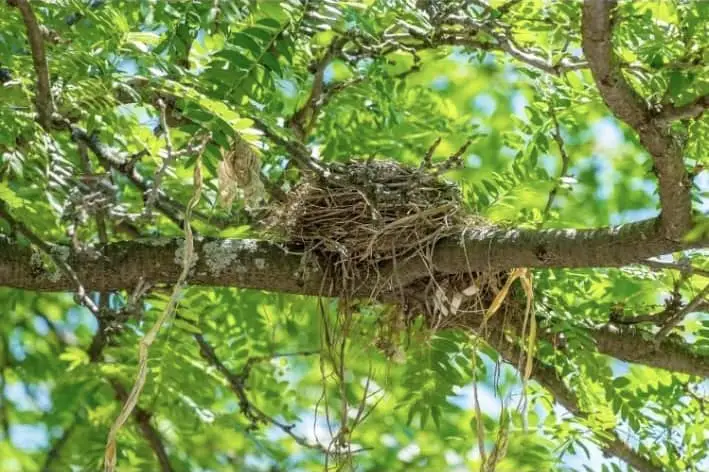Contrary to popular belief, birds don’t typically sleep in the nest they make. The main function of a nest is to provide a safe, warm place for eggs to hatch into nestlings, and for nestlings to eventually become fledglings. Where a mother bird will sleep while her babies are in the nest will depend on the location of her nest and the presence of any predators.
Bird Sleeping: Where do Birds Sleep?
The main consideration of a bird when choosing where to sleep is security. Many birds have predators, lots of which hunt during the night. Bird sleeping usually occurs in hedge rows, trees, bushes and log piles so that they are concealed from birds of prey from above, such as crows and blue jays. Meanwhile, the same place must be inaccessible to predators on the ground, such as foxes and cats.
Birds are known for choosing many weird places to sleep, from car bonnets to sheds, wellies to coat pockets! Their preference is to stay warm, dry and safe from predators. A bird sleeping place is most commonly completely separate to their nest.
Bird Sleeping: Do Birds Sleep in the Same Place Every Night?
It is counter-intuitive for a bird to sleep in the same place every night. They won’t sleep in the exact same spot for more than a few nights in a row because this increases their chances of being preyed upon at night.
Having said this, they typically like to stay around the same area, unless they are a migration bird. This is because they know they can rely on food sources nearby, both for themselves and for their nestlings. A mother bird can make upwards of 100 trips per day to and from the nest to feed her nestlings, so it’s important that she doesn’t have to travel too far!
Bird Sleeping: How Long Do Birds Sleep For?
Diurnal birds such as robins, dunnocks and sparrows typically sleep when it is dark and are active when it is light. In the UK, this means anywhere between 8 and 16 hours sleep per night. In addition to this, they sometimes take naps during the day, provided they are well-fed and away from predators.
Diurnal birds aren’t able to see well in the dark, meaning they can’t use this time to feed or fly. This is why they tend to sleep for such long periods of time. Some evidence suggests that birds don’t actually need to sleep for this many hours, but they do so because they aren’t able to do anything else because of their poor night vision.
Bird Nests
Depending on the type of bird, bird nests will often be made from twigs, moss, dead leaves, and feathers. These warm, sheltered spaces are designed to provide security for a baby bird from the time the egg is laid through to when the fledgling leaves the nest.
Although this seems like an ideal place for a bird, sleeping at night, it would take considerable effort to build a new nest in a different location every night. Nests are often more visible to predators than a bird would be if it just slept overnight in a tree trunk.
Does a Mother Bird Sleep in the Nest with their Nestlings?
The short answer? No. Nests have the primary purpose of keeping nestlings safe and warm. Parent birds will often spend the majority of their time feeding the babies during the day, so will need to rest overnight (or during the day if they are nocturnal).
While a mother bird won’t sleep inside the nest with their babies, they are often nearby in order to respond quickly when they require food or if predators are nearby. A mother bird will make a considerable number of trips to and from the nest each day, so having a food source and the nest close by to where they sleep is crucial.
Once the baby birds have flown the nest, the mother is unlikely to use the nest for bird sleeping. This is primarily because unused nests are a magnet for parasites, which can cause infections. Sadly, there may also be dead chicks and unhatched eggs inside the nest. There are likely to be feathers and faeces scattered around the nest too, which allow parasites to thrive.
Some birds may clean their nest and reuse it the following breeding season, but most do not. Read a tutorial on how to clean your bird box.
Which Animals Prey on Birds?
In the UK, common birds of prey include buzzards, kestrels, sparrowhawks, magpies, jays, crows and ravens. Most of the populations of these birds are increasing currently, which is considered to be one factor why the populations of small birds such as dunnocks, tree sparrows and house sparrows are in decline.
Other considerations as to why garden bird populations are in decline include removal of bird habitats, air pollution, use of herbicides and food scarcity.
The populations of most predatory mammals are also increasing in the UK. The populations of foxes, badgers, polecats, pine martens, non-native American mink and grey squirrels are all increasing. These only account for the wild animals that prey on birds – domestic cats and dogs are also responsible for preying on many small garden birds.
You may like…
- What Are Bird Territories
- 4 Possible Reasons Why Robins Sing At Night
- Why Robins Have Red Chests
- Where Do Robins Go As Night Falls
- Where Do European Robins Go In Winter
- Where Do European Robins Go In Summer
- The Difference Between European Robin & American Robin
- Do European Robins Migrate
- Do Male & Female European Robins Sing
- Where Do European Robins Live
- Do Birds Use Birdhouses In Winter
- What Do Blue Tits Eat
